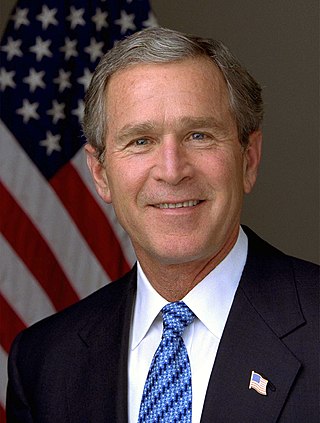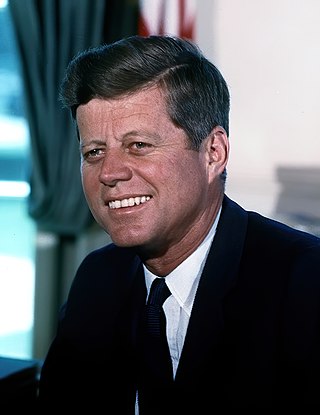| |||||
| Decades: | |||||
|---|---|---|---|---|---|
| See also: | Other events of 1994 Years in Iran | ||||
Events from the year 1994 in Iran.
| |||||
| Decades: | |||||
|---|---|---|---|---|---|
| See also: | Other events of 1994 Years in Iran | ||||
Events from the year 1994 in Iran.

William Jefferson Clinton is an American lawyer and politician who served as the 42nd president of the United States from 1993 to 2001. A member of the Democratic Party, he previously served as governor of Arkansas from 1979 to 1981 and again from 1983 to 1992. Clinton, whose policies reflected a centrist "Third Way" political philosophy, became known as a New Democrat.

Dwight David Eisenhower, nicknamed Ike, was an American military officer and statesman who served as the 34th president of the United States from 1953 to 1961. During World War II, he was Supreme Commander of the Allied Expeditionary Force in Europe and achieved the five-star rank as General of the Army. Eisenhower planned and supervised two of the most consequential military campaigns of World War II: Operation Torch in the North Africa campaign in 1942–1943 and the invasion of Normandy in 1944.

James Earl Carter Jr. is an American politician and humanitarian who served as the 39th president of the United States from 1977 to 1981. A member of the Democratic Party, he was the 76th governor of Georgia from 1971 to 1975, and a Georgia state senator from 1963 to 1967. At age 99, Carter is the oldest living former U.S. president and the longest-lived president in U.S. history.

The president of the United States (POTUS) is the head of state and head of government of the United States of America. The president directs the executive branch of the federal government and is the commander-in-chief of the United States Armed Forces.

The president of France, officially the president of the French Republic, is the executive head of state of France, and the commander-in-chief of the French Armed Forces. As the presidency is the supreme magistracy of the country, the position is the highest office in France. The powers, functions and duties of prior presidential offices, in addition to their relation with the prime minister and government of France, have over time differed with the various constitutional documents since the Second Republic.

The vice president of the United States (VPOTUS) is the second-highest office in the executive branch of the U.S. federal government, after the president of the United States, and ranks first in the presidential line of succession. The vice president is also an officer in the legislative branch, as the president of the Senate. In this capacity, the vice president is empowered to preside over the United States Senate, but may not vote except to cast a tie-breaking vote. The vice president is indirectly elected at the same time as the president to a four-year term of office by the people of the United States through the Electoral College, but the electoral votes are cast separately for these two offices. Following the passage in 1967 of the Twenty-fifth Amendment to the US Constitution, a vacancy in the office of vice president may be filled by presidential nomination and confirmation by a majority vote in both houses of Congress.

Lyndon Baines Johnson, often referred to as LBJ, was an American politician who served as the 36th president of the United States from 1963 to 1969. He became president after the assassination of John F. Kennedy, under whom he had served as the 37th vice president from 1961 to 1963. A Democrat from Texas, Johnson also served as a U.S. representative and U.S. senator.

The president of India is the head of state of the Republic of India. The president is the nominal head of the executive, the first citizen of the country, as well as the supreme commander of the Indian Armed Forces. Droupadi Murmu is the 15th and current president, having taken office from 25 July 2022.

Alberto Kenya Fujimori Inomoto was a Peruvian politician, professor, and engineer who served as the 54th president of Peru from 1990 to 2000. Of Japanese descent, Fujimori was an agronomist and university rector before entering politics. Generally recognized as a civilian-military dictatorship, his government was characterized by its use of propaganda, widespread political corruption, and human rights violations.

The federal government of the United States is the national government of the United States, a federal republic located primarily in North America, composed of 50 states, five major self-governing territories, several island possessions, and the federal district of Washington, D.C., where most of the federal government is based.

The Senate of the Philippines is the upper house of Congress, the bicameral legislature of the Philippines, with the House of Representatives as the lower house. The Senate is composed of 24 senators who are elected at-large under a plurality-at-large voting system.

Barack Hussein Obama II is an American politician who served as the 44th president of the United States from 2009 to 2017. As a member of the Democratic Party, he was the first African-American president in U.S. history. Obama previously served as a U.S. senator representing Illinois from 2005 to 2008 and as an Illinois state senator from 1997 to 2004.

George Walker Bush is an American politician and businessman who served as the 43rd president of the United States from 2001 to 2009. A member of the Republican Party, he also served as the 46th governor of Texas from 1995 to 2000.

Gerald Rudolph Ford Jr. was an American politician who served as the 38th president of the United States from 1974 to 1977. He previously served as the leader of the Republican Party in the U.S. House of Representatives from 1965 to 1973, and as the 40th vice president under President Richard Nixon from 1973 to 1974. Ford succeeded to the presidency when Nixon resigned in 1974, but was defeated for election to a full term in 1976. Ford is the only person to serve as president without winning an election for president or vice president.

John Fitzgerald Kennedy, often referred to as JFK, was an American politician who served as the 35th president of the United States from 1961 until his assassination in 1963. He was the youngest person elected president. Kennedy served at the height of the Cold War, and the majority of his foreign policy concerned relations with the Soviet Union and Cuba. A Democrat, Kennedy represented Massachusetts in both houses of the United States Congress prior to his presidency.

The election of the president and the vice president of the United States is an indirect election in which citizens of the United States who are registered to vote in one of the fifty U.S. states or in Washington, D.C., cast ballots not directly for those offices, but instead for members of the Electoral College. These electors then cast direct votes, known as electoral votes, for president, and for vice president. The candidate who receives an absolute majority of electoral votes is then elected to that office. If no candidate receives an absolute majority of the votes for president, the House of Representatives elects the president; likewise if no one receives an absolute majority of the votes for vice president, then the Senate elects the vice president.

The president of Mexico, officially the president of the United Mexican States, is the head of state and head of government of Mexico. Under the Constitution of Mexico, the president heads the executive branch of the federal government and is the commander in chief of the Mexican Armed Forces. The current president is Andrés Manuel López Obrador. The current president-elect is Claudia Sheinbaum, who will take office on October 1, 2024.

The United States Senate is the upper chamber of the United States Congress. The United States Senate and the lower chamber of Congress, the United States House of Representatives, comprise the federal bicameral legislature of the United States. Together, the Senate and the House have the authority under Article One of the U.S. Constitution to pass or defeat federal legislation. The Senate has exclusive power to confirm U.S. presidential appointments to high offices, approve or reject treaties, and try cases of impeachment brought by the House. The Senate and the House provide a check and balance on the powers of the executive and judicial branches of government.